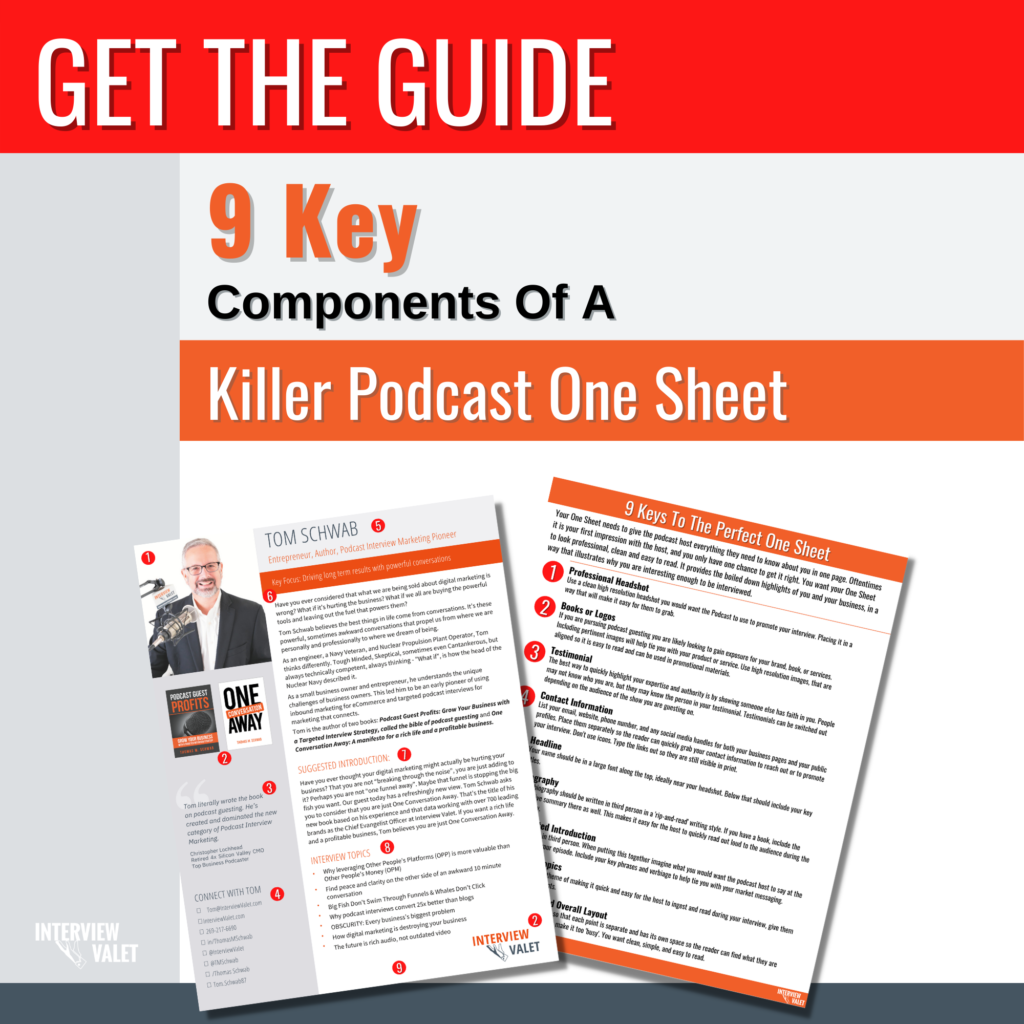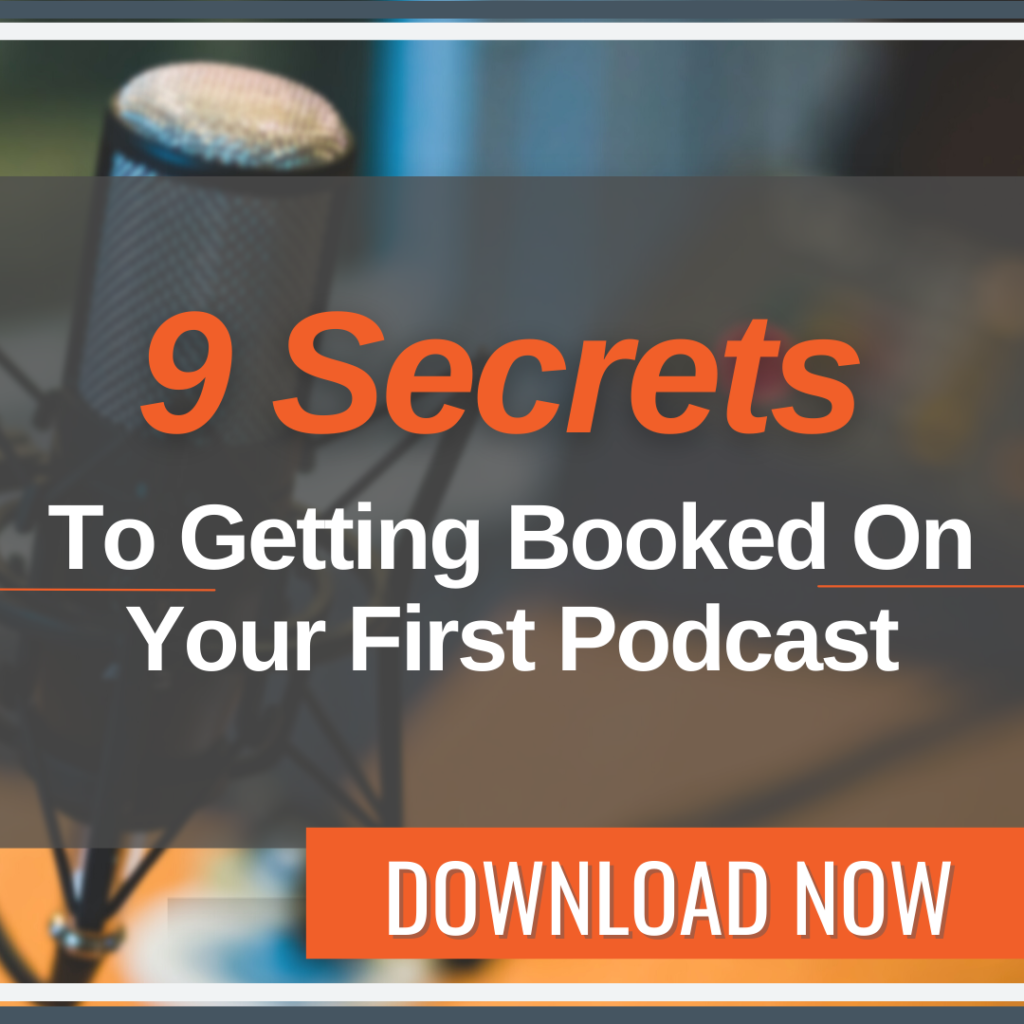
A podcast one sheet is your holy grail to getting booked as a podcast guest and nailing the podcast interview.
When you are reaching out to prospective podcasts to do a guest interview, the podcast one sheet is critical for showing the host exactly why you would be a good guest for their show. It also articulates key points that make the interview itself easier for the host to facilitate. When you create a killer podcast one sheet as the guest, everyone wins. Plus, it increases the likelihood of being invited back.
When you send out inquiries to podcast hosts to be a guest, including your one sheet will show you are a professional and plan to take the interview seriously. It will show the host a clear picture of the value and expertise you can provide to their show and their audience.
It is also a good idea to send the one sheet to the host prior to your interview once you are booked for the show as well. It shows initiative and eliminates the extra step for the host to search through previous emails to find it.
So, what are the key components to include on a podcast one sheet? After over 50,000 interviews and lots of feedback from podcast hosts, Interview Valet gives you the nine key components that every podcast guest should include on their podcast one sheet.
9 Key Components of a Killer Podcast One Sheet
1| A Clear Picture for Social Media
At the top of your one sheet, have a clear, high-quality headshot that will be easy for the podcast host to pull for promotion on social media or their website.
2| Books or Logos
Include a high-quality image of your business logo. If you have written a book, include your latest or most popular book as well. You want to tie yourself with your brand and imagery.
3| A Testimonial That Would Be Meaningful To Them
This isn’t where the testimonial from your mom goes. Choose a testimonial best suited for the niche or industry of the podcast you are reaching out to. For example, if you are looking to guest on an investment podcast and you have a testimonial from a renowned real estate investor, use that one.
4| Contact Information—Social Media, Phone Number, Email
Don’t make the host guess which Karen Smith you are on LinkedIn. Write out your URLs and social media handles and hyperlink them. That way, the host can find you by clicking on the link if the one sheet is on their computer, and the information is still visible in printed form as well.
5| Who You Are, Your Role, and Your Title
Make this stand out. It should be clearly written front and center along the top of the page. Again, it should apply to the skills you want to present on the podcast.
6| Talk about Your Key Focus
What value do you bring to the podcast show? Emphasize the skills and values that align with the show in a way that will encourage listeners to want to tune in to listen.
7| Biography
Here’s a space for you to put some information about yourself. Keep it professional. Hosts don’t want to hear about your family and your 6-acre farm. Keep it applicable to what the podcast show audience would be interested in.
8| Rip and Read Intro
Have a section that contains a third-person introduction of you exactly how you would like to be introduced. This enables the host to “rip and read” your introduction without much thought. This will make you and the podcast host look good because you are ensuring they get it right every time.
9| Provide a List of Interview Topics
This isn’t a space for you to provide word-for-word questions that the host will ask. Instead, offer topic prompts. Big ideas are a great jumping-off point for you and the host to go into deeper. This also facilitates continuity for branding across all your interviews.
This isn’t a resume. It should be one page, easy-to-read, and easy-to-navigate for the podcast host. When people get confused by looking at a one sheet, they are unlikely to spend time trying to figure it out; they will toss it in the trash can. So, be mindful of your design and ensure it isn’t cluttered.
Four Things You Should Avoid
We told you what you should include, but what should you leave out?
1| Pick Your Color Scheme Wisely
The most important part of your color scheme is that it promotes easy readability. White text on a black background is difficult to read and isn’t printer friendly. Dark text on a white background is easiest on the eyes and takes the strain off the reader.
2| Make Sure Your One Sheet Is Easy to Navigate
Again, don’t get too creative with this. Prioritize simplicity over cleverness. You want the reader to look at your one sheet and know exactly what they are looking at. You don’t have to reinvent the wheel. Titles should be big and bold, and each section should be separated in a way that guides the reader’s eyes along the page.
3| A One Sheet Isn’t a Resume
Your one sheet isn’t a resume, so it shouldn’t look like one. It should highlight everything the host needs to know, but it doesn’t need to cover nearly as much information as a resume. The host doesn’t need a detailed list of your work history and your GPA from school. It should be a quick summary of skills, expertise, and achievements.
4| Focus on What’s In It for the Host and the Audience
It’s easy to get caught up in the wrong information. Create your one sheet bearing in mind that the host and audience knows nothing about you. What do they need to know for you to gain their trust as a thought leader in your industry? Read your one sheet from the lens of the host and the listener. What should you highlight to draw them in?
Looking For More?
Read more about podcast interview marketing with these resources.


